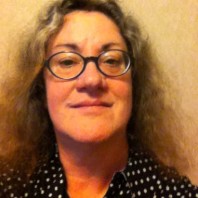Welcome

Carol Siegel, Professor of English and American Studies
“I was born by the river in a little old tent, and just like that old river I’ve been running ever since” — oh, oh, wrong biography. Start the record again. I was born in Englewood, New Jersey due to the bumpiness of the road outside town. After we left the hospital, we continued on to New York, but what happened after that is a long story I don’t care to tell here. Suffice it to say that my significant life began in San Francisco, my home town by default, where I have spent most and the happiest years of my life.
After having learned nothing in the first 12 years of my education except how to recite “The Raven” from memory and a lengthy hiatus doing various types of unskilled labor, I received my A.A. in Humanities from San Francisco City College, a B.A. and M.A. in English from San Francisco State, and a Ph.D. in English from U.C. Berkeley. By age 17 I had discovered that besides hanging around drinking coffee and chatting with witty people, watching films, reading, and listening to music, I found little in life to my liking. By the end of graduate school, I was able to add teaching people things about books to the list, so I decided to become a professor.
Easier said than done. Several years older and deeper in debt, I woke up one day and, while the trumpets pealed Truth! Truth! Truth! I had no choice left but confess — I was a professor. And so it has been ever since. In keeping with the obstinate contrariness that has characterized every aspect of my life, no sooner had I discovered that I was a feminist literary critic than I decided to write a book (Lawrence Among the Women, 1991) explaining why D. H. Lawrence, a writer hated by the vast majority of feminist critics, should really be considered an important part of women’s literary traditions. Having set out on the path of writing from a female perspective (e.g. my own) about the representation of masculinity in works of art, I continued until finally I discovered to my amazement that I had morphed into a Gender Studies theorist.
One thing led to another, as it so often does. And before too long I had written another book called Male Masochism (1995). In this book I argue that the attitudes and behaviors once valorized in men as pure expressions of romantic love are now denigrated as masochism. I also became a co-editor of the interdisciplinary journal Rhizomes. At this point, tired of spending every other moment of my life in the library, I returned to the loud rock clubs I have always loved and discovered that the world was now filled with the best rock music I had ever heard. And somehow young people had become far smarter and more interesting than they had been previously. As seems to be my way, I wrote a book about it all: New Millennial Sexstyles (2000).
I continued clubbing and in the process met many Goths who inspired me to investigate the fascinating culture they have created. Then the Columbine school massacre occurred, and to my horror, Goths were unjustly blamed. At the request of Goths I knew, I wrote a book to set the record straight about these wonderful, creative, and predominately very gentle people. The result was Goth’s Dark Empire (2005).
In the meantime, I continue amusing myself and, I hope, others by teaching a variety of college classes. In all seriousness, as I can frequently be heard shouting in the halls, working with students is often the only thing that I truly enjoy about being a professor. But then again, sometimes I enjoy it all. So yes, there is hope of happiness, even for English majors who have turned into Cultural Critics through no fault of their own. To learn what YOU can do with a degree in English or Humanities, drop by my office and let’s talk.
Departments:
Arts and Sciences
Critical Culture, Gender, & Race Studies
English
siegel@wsu.edu
Office: (360) 546-9641
Located in Multimedia (VMMC) SS202
Office Hours: MWF 10:00-11:00
Support Staff: Annette Bradstreet